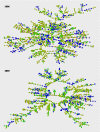Dynamic spread of happiness in a large social network: longitudinal analysis over 20 years in the Framingham Heart Study
- PMID: 19056788
- PMCID: PMC2600606
- DOI: 10.1136/bmj.a2338
Dynamic spread of happiness in a large social network: longitudinal analysis over 20 years in the Framingham Heart Study
Abstract
Objectives: To evaluate whether happiness can spread from person to person and whether niches of happiness form within social networks.
Design: Longitudinal social network analysis.
Setting: Framingham Heart Study social network.
Participants: 4739 individuals followed from 1983 to 2003.
Main outcome measures: Happiness measured with validated four item scale; broad array of attributes of social networks and diverse social ties.
Results: Clusters of happy and unhappy people are visible in the network, and the relationship between people's happiness extends up to three degrees of separation (for example, to the friends of one's friends' friends). People who are surrounded by many happy people and those who are central in the network are more likely to become happy in the future. Longitudinal statistical models suggest that clusters of happiness result from the spread of happiness and not just a tendency for people to associate with similar individuals. A friend who lives within a mile (about 1.6 km) and who becomes happy increases the probability that a person is happy by 25% (95% confidence interval 1% to 57%). Similar effects are seen in coresident spouses (8%, 0.2% to 16%), siblings who live within a mile (14%, 1% to 28%), and next door neighbours (34%, 7% to 70%). Effects are not seen between coworkers. The effect decays with time and with geographical separation.
Conclusions: People's happiness depends on the happiness of others with whom they are connected. This provides further justification for seeing happiness, like health, as a collective phenomenon.
Conflict of interest statement
Competing interests: None declared.
Figures





Comment in
-
Commentary: Understanding social network analysis.BMJ. 2008 Dec 4;337:a1957. doi: 10.1136/bmj.a1957. BMJ. 2008. PMID: 19056787 No abstract available.
-
Happiness, social networks, and health.BMJ. 2008 Dec 4;337:a2781. doi: 10.1136/bmj.a2781. BMJ. 2008. PMID: 19056790 No abstract available.
-
Happiness networks. What about social politics?BMJ. 2009 Jan 28;338:b292. doi: 10.1136/bmj.b292. BMJ. 2009. PMID: 19176664 No abstract available.
-
Happiness networks. Know your friends.BMJ. 2009 Jan 28;338:b293. doi: 10.1136/bmj.b293. BMJ. 2009. PMID: 19176665 No abstract available.
References
-
- De Gargino JP. Children’s health and the environment: a global perspective. Geneva: World Health Organization, 2004.
-
- Kahneman D, Krueger AB, Schkade D, Schwarz N, Stone AA. Would you be happier if you were richer? A focusing illusion. Science 2006;312:1908-10. - PubMed
-
- Clark AE, Oswald AJ. Satisfaction and comparison income. J Public Econ 1996;61:359-81.
Publication types
MeSH terms
Grants and funding
LinkOut - more resources
Full Text Sources
Other Literature Sources
Medical
Molecular Biology Databases
